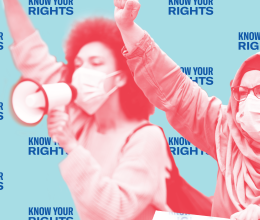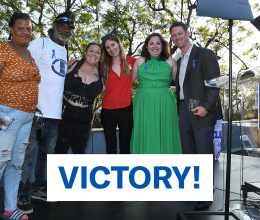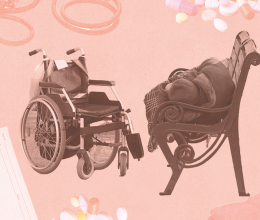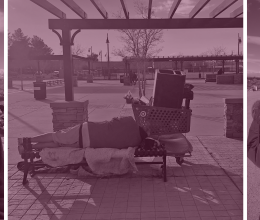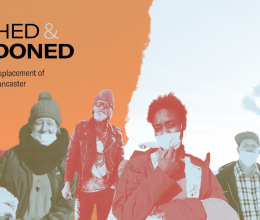
When the City of Lancaster and the Los Angeles Sheriff’s Department banished J. to the Mojave Desert, she came close to paying with her life.
Left to fend for herself in the blistering summer heat, J. was forced to tote five-gallon containers of water from the nearest convenience store, which was miles away. Before long, she fell ill with heat sickness and crawled into her tent. Her phone battery ran out of charge, and she began rationing her water. As the days passed, she waited to die.
Like J., most unhoused community members in and around Lancaster must somehow find a way to navigate the perils of the high desert, where triple digit heat in the summer and freezing temperatures in the winter are the norm.
But instead of ensuring that unhoused people have access to life-saving housing and services, an investigation by the ACLU of Southern California finds that city officials’ primary response has been to stop, cite and jail people for being unhoused and banish them to the high desert, where they are quite literally left to die.
Inside city limits, unhoused residents face a draconian police state that is impossible to avoid. Although people who are unhoused make up only about one percent of Lancaster’s population, they represent almost half of all stops by Los Angeles County sheriffs to enforce the city’s municipal code.
As described in our report, “Banished and Abandoned: Criminalization and Displacement of Unhoused People in Lancaster,” most police harassment targets people simply for being unhoused in public. Officers bulldoze encampments, destroying tents and discarding crucial belongings like medication. They target Black people, citing them for resting or camping in public at disproportionately high rates. They tell unhoused people to keep moving if they stand, sit or lie down in public, and issue them criminal citations if they rest in the shade for as little as three minutes. One unhoused resident, a veteran who uses a wheelchair, estimated that police approach him up to 14 times a day. He said the cartilage in his shoulders has worn down because he must regularly wheel himself away from deputies who order him to leave.
If relentless police harassment does not convince unhoused people to leave the city, officers banish them to the high desert in unincorporated Los Angeles County, where, like J., they are far removed from life-saving resources like food, water and medical care.
Once banished, people have limited ability to fight back. Since they are technically no longer city residents, they lose the right to vote in city elections, preventing them from voting for or against the officials responsible for their banishment. “The city left us with no vote and no voice,” said Melissa Ivory, who was banished to the high desert by sheriff’s deputies. “We are like a piece of wind that carries a voice, but it’s not heard at all.”
The law enforcement tactics uncovered by the ACLU SoCal investigation are not only immoral and life threatening; they also violate a number of civil rights, including the rights to due process, freedom of movement and free speech.
J. survived her harrowing brush with death. Her daughter, unable to reach J. by phone, became alarmed and set out to search for her. By luck, she found J.’s tent and nursed her back to health.
But Lancaster and Los Angeles County officials should have never placed J. in danger in the first place. Our local governments must unequivocally reject the forms of state-sanctioned violence described in the report . Instead, we must demand that Lancaster and Los Angeles County officials treat homelessness as a human rights violation and humanitarian crisis.
The report calls for immediate city and county reforms, including cessation of criminalization and banishment, elimination of laws and policies that criminalize homelessness and provision of restitution, compensation for losses and rehabilitation for targets of criminalization and banishment.
Officials should start by immediately meeting the survival needs of unhoused people and treating them with the dignity and respect to which we are all entitled.
